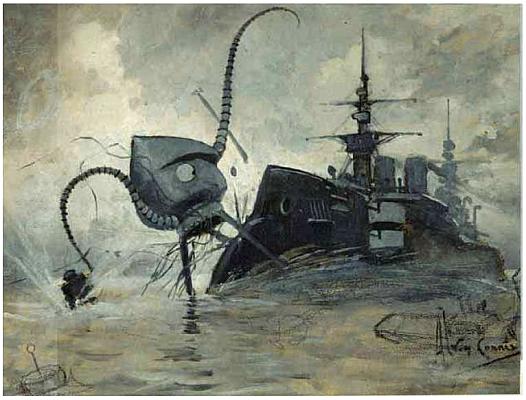The War of the Worlds
The War of the Worlds (1898), a science fiction novel by H. G. Wells, is the first-person narrative of an unnamed protagonist’s (and his brother’s) adventures in London and the countryside around London as Earth is invaded by Martians. Written in 1895–97, it is one of the earliest stories that details a conflict between mankind and an extraterrestrial race. The novel is one of the most commented-on works in the science fiction canon.

The plot has been related to invasion literature of the time. The novel has been variously interpreted as a commentary on evolutionary theory, British imperialism, and generally Victorian superstitions, fears and prejudices. At the time of publication it was classified as a scientific romance, like his earlier novel The Time Machine. The War of the Worlds has been both popular (having never gone out of print) and influential, spawning half a dozen feature films, radio dramas, a record album, various comic book adaptations, a television series, and sequels or parallel stories by other authors. It has even influenced the work of scientists, notably Robert Hutchings Goddard.

Interpretation regarding Colonialism and imperialism
At the time of the novel’s publication the British Empire was in its most aggressive phase of expansion, having conquered and colonised dozens of territories in Africa, Australia, North and South America, the Middle East, South and Southeast Asia, and Atlantic and Pacific islands. It was one of a number of European empires, whose competition to conquer other nations was one factor that eventually led to the First World War.
While Invasion Literature had provided an imaginative foundation for the idea of the heart of the British Empire being conquered by foreign forces, it was not until The War of the Worlds that the reading public of the time was presented with an adversary so completely superior to themselves and the Empire they were part of. A significant motivating force behind the success of the British Empire was its use of sophisticated technology; the Martians, also attempting to establish an empire on Earth, have technology superior to their British adversaries. In writing The War of the Worlds, Wells turned the confident position of a reader in the British Empire on its head, putting an imperial power in the position of being the victim of imperial aggression and thus perhaps encouraging the reader to consider the nature of imperialism itself.
Wells suggests this idea in the following passage from the novel:
And before we judge them [the Martians] too harshly, we must remember what ruthless and utter destruction our own species has wrought, not only upon animals, such as the vanished Bison and the Dodo, but upon its own inferior races. The Tasmanians, in spite of their human likeness, were entirely swept out of existence in a war of extermination waged by European immigrants, in the space of fifty years. Are we such apostles of mercy as to complain if the Martians warred in the same spirit?
—Chapter I, “The Eve of the War“
This also challenged the Victorian notion of there being a natural order, in which the British Empire had a right to rule through their own superiority over subject races.
See also: